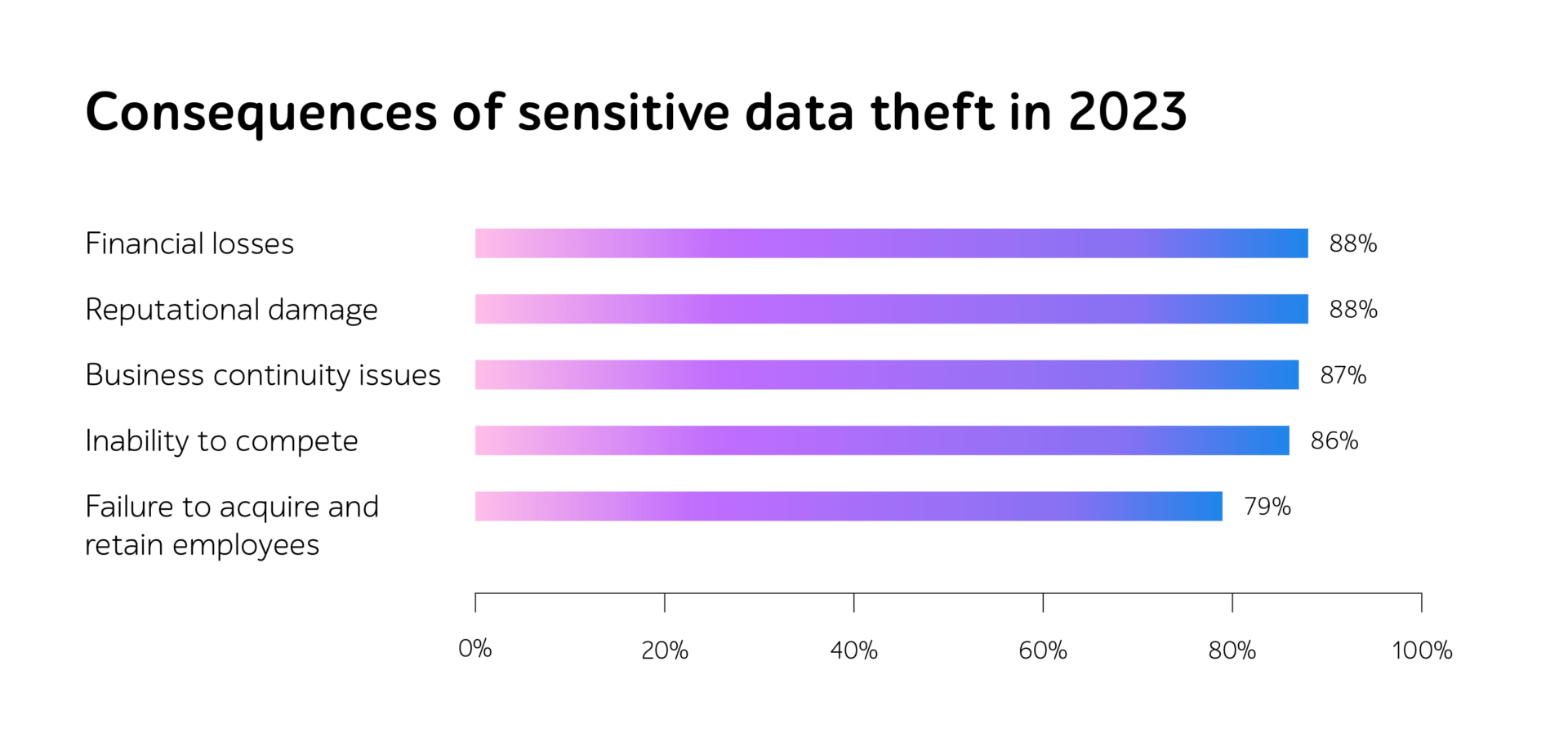
Navigating the future: QA trends that will define 2024. Part 2
In the first part of our article, we revealed how companies could obtain their business objectives by focusing on QA trends, such as:
- Shifting beyond traditional test automation to maximize the benefits
- Embracing Agile practices to strengthen competitive edge
- Prioritizing value over speed to drive strategic business outcomes.
Let’s look at three more software testing methods that are paramount in 2024!
Trend #4. Adopt a security-first approach to fortify business resilience
With the average cost of a data breach coming to $16 million last year, 47% of the World Quality Report (WQR) 2023-24 respondents ranked cybersecurity as a top priority for 2024 to prevent potential system vulnerabilities and improve its overall reliability.
But sensitive data failures aren’t just about financial losses. In 2023, 88% of businesses faced reputational damage, 87% — encountered business continuity issues, 86% — lost their competitive advantage, and 79% — were unable to acquire and retain employees.

Source: Annual Data Expose Report 2023
So, what QA best practices can help companies cultivate a culture of safety awareness and mitigate the risk of cyber threats?
- Integrate security testing into the CI/CD pipeline to detect weak points early on and swiftly remediate them while reducing the expenses associated with addressing flaws in post-production. Additionally, it allows you to run automated tests on code changes, build creation, and ensure consistent testing across diverse scenarios.
- Implement comprehensive security policies, covering such aspects as password strength and rotation frequency, access control levels, safe document handling practices, and regular security checks. This assists in fortifying company’s defenses and promoting a culture of vigilance against potential threats. To quickly respond to cyber events, businesses should regularly update an incident response plan and test security protocols.
- Leverage DevOps practices to establish security perimeters and risk-free environments. This approach ensures continuous monitoring and mitigation of potential vulnerabilities, enhancing overall safety posture.
- Adopt security-focused code reviews to create robust processes, prevent loopholes in the software and systematically scrutinize code for weaknesses.
- Conduct regular security audits, including penetration testing, vulnerability and compliance assessments, to evaluate the effectiveness of existing safety measures, protocols, and software. As hackers develop new sophisticated methods to penetrate systems, it’s mission-critical to ensure that the audits are designed in line with the latest trends.
- Establish an education program to ensure employees adhere to security protocols and remain informed and vigilant.
Trend #5. Introduce cloud testing to improve software reliability
Eliminating the need for significant upfront investments in physical infrastructure, deploying applications and services faster, reducing time to market, scaling up or down based on demand — these are some of the core reasons why businesses adopt cloud servers.
As migrating to the cloud alone doesn’t guarantee system security and reliability, 82% of WQR respondents consider cloud testing a must-have. It is indispensable to validate the functional and non-functional aspects of applications in the cloud environment and ensure they withstand unexpected outages and cybersecurity threats. Companies may also introduce migration testing to guarantee seamless data transitions, prevent downtime, and exclude information losses within the cloud.
The final choice of a testing strategy depends on specific business needs, existing infrastructure, budget considerations, and the desired level of control. For instance, 58% of organizations selected a hybrid option due to cost optimization in 2023.
Trend #6. Stick to QA sustainability to minimize environmental impact
In the pursuit of technological excellence, the imperative to align quality engineering practices with environmental sustainability stands as a crucial trend.
Recognizing the escalating impact of IT on the planet, 97% of companies actively integrate sustainability into their QA processes to prevent environmental harm (WQR). While 2,016 C-level executives surveyed by Deloitte have acknowledged that it also has a positive impact on brand reputation (52%), customer satisfaction (44%), and employee well-being (42%).
So, how can organizations seamlessly weave sustainability into their QA practices, ensuring a commitment to environmental responsibility across the entire software development lifecycle? Below are some recommendations to follow.
Tip #1. Develop and track comprehensive sustainability metrics for the organization
Having clear sustainability KPIs enables companies to quantitatively assess their efforts, identify areas for improvement, and demonstrate progress toward reducing their overall environmental footprint.
Tip #2. Adopt test automation
Test automation can significantly reduce the environmental impact of software testing by streamlining and optimizing the QA process. While creating automated scripts may initially require energy, the long-term benefits include minimized manual intervention, resulting in lowered energy consumption associated with human-operated QA activities.
Tip #3. Implement eco-friendly test environments
Leveraging eco-friendly solutions, such as virtualization, containerization, and emulators, aids to reduce the need for physical hardware, decrease energy expenditure, and contribute to a more sustainable software development lifecycle. Thus, businesses promote resource efficiency, reduce environmental impact, and foster a culture of eco-conscious QA practices within the company.
Tip #4. Rely on shift-left testing
By shifting testing earlier in the development lifecycle, organizations identify and address issues sooner and can reduce resource utilization by minimizing the need for extensive testing later on.
In a nutshell
To stay competitive in a fast-changing business landscape and attain the desired outcomes in the coming year, companies may rely on critical QA trends: shifting beyond traditional test automation, embracing Agile practices, prioritizing value over speed, adopting a security-first approach, introducing cloud testing, and sticking to QA sustainability.
By integrating these practices into their processes, organizations meet the evolving demands of the IT market, reduce operational expenditure, accelerate software releases, and boost CX.
Connect with a1qa’s team to get professional QA support tailored to your specific needs.








